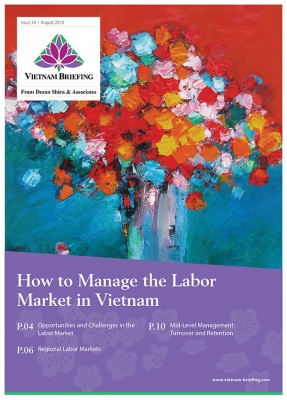
Our collection of resources based on what we have learned on the ground
HR and Payroll in Vietnam - An Overview
ArticleAfter setting up a business in Vietnam, the next big hurdle is hiring the staff that you will need to help grow your operation. The initial hiring process and, ultimately, payroll administration can quickly become a complex and confusing process. Labor intensive sectors, such as manufacturing, are almost certain to face a significant degree of exposure to these challenges, while all companies setting up within Vietnam – from representative offices to fully foreign-owned enterprises – will face some liability.
As a first step towards meeting the challenges presented by payroll, companies should be aware of the basic statutory requirements imposed under Vietnamese law. With this in mind, the following are the most significant payroll related obligations for employers:
- Minimum wages;
- Overtime wages;
- Individual income tax withholding requirements;
- Social insurance withholding requirements.
Minimum wages
Vietnam’s minimum wage rates play a significant role in payroll compliance. Currently, there are two kinds of minimum wages.
Common minimum wage
The first type is the common minimum wage, which is used to calculate salaries for employees in state-owned organizations and enterprises and, from a payroll compliance perspective, the social insurance contributions for all enterprises (the maximum social insurance contribution is 20 times the common minimum wage). The common minimum wage is VND 1,300,000 (US$57) since July 1, 2017. With effect from 1 July 2018, the common minimum wage applied will be VND 1,390,000 per month (US$ 60.95).
Regional private sector minimums
The second type of minimum wage is used for employees in all non-state enterprises and is based on regions as defined by the government. From January 2017, these regions have set baseline compensation rates between VND 2.58 million (US$113) and VND 3.75 million (US$165). Unlike the common minimum wage, the private sector minimum wage rate depends on the location where the worker is employed. Currently, Vietnamese cities are split into a four-tiered regional system to reflect the socioeconomic conditions within cities across the country.
Overtime
Employers are required to pay employees at increased rates for all overtime work completed each month. Not only does overtime pay stand to increase immediate payroll costs, but it can also have significant impacts on social insurance withholdings as well as income tax. Companies that understand when overtime is applied and at what cost it is applied will be able to plan effectively and ensure that calculations of individual income tax and social insurance contributions are made correctly.
Triggering overtime
The normal working week in Vietnam is limited to no more than eight hours in one day and no more than 48 hours per week. Any work hours beyond these limits must be compensated at a rate beyond what is set forth within the employees’ labor contract.
Overtime compensation
Employees who work in excess of normal working times must be paid extra for those hours based on their current wages as follows: regular working days – 150 percent; weekends – 200 percent; and holidays and paid leave days – 300 percent. A ceiling for total working hours, inclusive of overtime, is imposed at no more than 12 hours in one day, while overtime is capped at 30 hours in one month and 200 hours annually.
Individual income tax withholdings
In Vietnam, personal income tax (PIT) declaration and payment is carried out on a withholding basis. Vietnam’s tax regulations encompass the concept of tax deducted at the source and legalize this by specifying certain employers are designated for tax collection purposes. Such entities are required to withhold PIT from employees’ salaries.
Monthly withholdings
Employers are required to collect taxes on employee income for both foreign and local employees and ensure the timely submission of employees’ tax declarations. Employers must withhold the required percentage of their employees’ personal income and deposit the monthly amount with the State Treasury no later than the 20th day of the following month.
Annual finalization
Employers must also finalize PIT declarations on behalf of their employees at the end of the year, provided the employee only has income from the employer, and authorizes their employer to make this tax finalization on their behalf. Companies must submit an annual tax finalization on employees’ taxable income no later than 90 days from the last day of the tax year. Each employee is required to obtain a unique individual tax number (or “tax code”) and declares dependents that qualify for tax relief. Additionally, employees must complete their own tax finalization returns where their tax liability at year-end is greater, or less, than the sum of tax paid during the year. Employees may authorize the company to complete this process on their behalf.
Social insurance
There are three types of mandatory social security in Vietnam that must be covered by foreign enterprises seeking to hire local staff:
- Social insurance;
- Health insurance; and,
- Unemployment insurance.
- Mandatory minimum contributions
Mandatory minimum contributions are required of both employer and employee. All domestic and foreign companies operating in Vietnam are required to pay these social insurances for all employees under labor contracts with a definite term of over three months or labor contracts with indefinite terms. The total minimum employer social security contribution is 21.5 percent.
Contributions are determined based on employees’ monthly salary or wage. Employers register and pay insurance contributions monthly on behalf of their employees at the provincial Department of Labor, Invalids and Social Affairs (DoLISA).
Social insurance contribution caps
While payable amounts will differ depending on the compensation of an employee, it should be noted that a wage ceiling for calculation of contributions is imposed at 20 times the common minimum wage for social and health insurance – VND 26,000,000 (US$1,140) – and 20 times the regional minimum wage for unemployment insurance – VND 51,600,000 (US$2,269) to VND 75,000,000 (US$3,298) depending on the region.
With effect from 1 July 2018, the minimum salary cap for SI/HI contributions will increase to VND 27,800,000 per month (US$ 1,220 per month). The minimum regional salary cap for UI contributions will range from VND 55,200,000 to VND 79,600,000 per month depending on each region (approximately US$ 2,430 –US$ 3,500 per month) from 1 January 2018.
Domestic vs international staff
Social and unemployment insurances are compulsory only for Vietnamese staff. Health insurance, on the other hand, applies to both Vietnamese and foreign staff employed in accordance with Vietnam’s Labor Code.
< BACK TO LIBRARY
Subscribe to receive latest insights directly to your inbox
Subscribe NowOur Clients
Discover our esteemed global clients across diverse sectors. We believe in providing our clients with exceptional service and a commitment to being their partner for growth in Asia.
See what our clients say about us


































